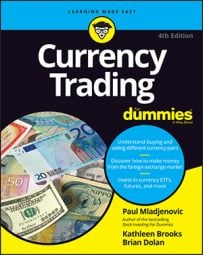Three things make you a good currency trader: platform, methodology, and psychology. Often traders have the first two covered, but they come up short in the psychology department.
Do you ever think that trading is too hard? That you can't seem to make money or make a good decision? If so, that's good! It means you're a perfectly normal trader who shares the doubts and fears of traders all over the world. The key is to develop a strategy to manage those doubts and fears so that they don't get in the way of your being a good trader.
Trading is hard on people — it makes them confront their fears around money, self-worth, and performance. In life, you spend most of your time somewhere in the middle, neither succeeding wildly nor failing miserably, but managing to muddle through. With trading, that isn't the case — you either make money or you don't, and you know how you performed immediately.
Here are some of the Achilles heels that can negatively impact a trader's performance:
Impatience: Many traders enter or exit a trade too quickly. They don't stick to their plans, lose, and then blame themselves for days afterward. This blame game leads to self-doubt, which can make you hate trading. If you're impatient, the key is to find out what triggers your impatience. Is it around major trading events like U.S. labor market data, when the market gets volatile for a few minutes? If so, don't trade during that time. Does it tend to occur if you've just had a losing trade? If so, instead of placing the first trade that comes into your head, write it down and leave it for an hour; then read it over and see if you want to place the trade. (You probably won't, but if you do, at least you'll know it wasn't because you were impatient.)
Fear: Fear is an important reaction, but sometimes it causes traders to freeze. If you're new to trading, just remember that currency trading gets easier the more you do it and the fear eventually subsides. Also, put things in perspective: No one will die as a result of your putting on one trade. If you use the correct money-management skills, and if you use a sell-stop order, then you should know how much money you may lose on any trade, which can limit the fear factor.
Pride: You know that feeling in your chest — the one that feels like everyone is watching and judging you if you fail. If you're worried about what other people will think of your performance, good news: Most people are too obsessed with their own lives to worry about yours. Plus, it's natural to make mistakes, so give it your best shot and don't let your pride get in the way of your learning and growing as a trader.
Greed: Did you let a trade run for too long because you thought you could wring another dollar from it? If so, you aren't alone. Greed clouds the senses. You shouldn't be trading, at least initially, to make a fortune. Have realistic expectations, and treat your early trades as an experiment. Try not to think of all the things you'll be able to buy with your earnings. Trading can make you a lot of money, if you're good at it, but it takes time. The best traders are passionate about trading — they're not in it for the money.
Expectations: You can easily let your expectations snowball. But if you reach for the moon too soon, you'll be disappointed, and that can lead to more mistakes. You won't become Warren Buffet overnight, or in six months, or with a $6,000 account. If you use the correct money-management skills, you should risk only 2 percent to 5 percent of your account balance on each trade. Anything else could lead you to risk too much of your account, which could wipe you out if the trade doesn't go your way. Don't expect to win all the time. Most successful traders with solid money-management systems in place may only win a little over 50 percent of the time.
Nurturing your psychological health is extremely important to your success as a trader.

